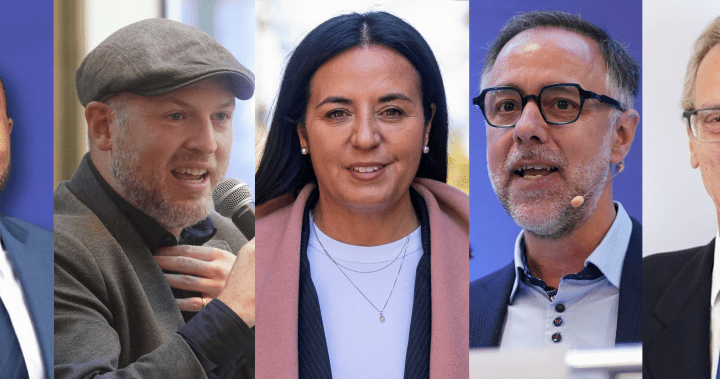Quebecers across the province will head to the polls this Sunday to cast their ballots and elect their municipal representatives.
Some candidates will be taking their first steps into their local city halls, while others could be re-elected in tight races.
Here are a few things to know.
A voter casts a ballot in Montreal, Monday, October 1, 2018, on Quebec provincial election day.
THE CANADIAN PRESS/ Graham Hughes
Where and when to vote?
Most voters should have received a voter information card by mail, which indicates where to cast their ballot. City of Montreal voters can visit the city’s website here for further information.
Residents of Laval, Longueuil and Montreal’s demerged municipalities can visit their city websites as well.
Polling stations will be open from 10 a.m. to 8 p.m. provincewide.
Who is eligible to vote?
To vote in a municipal election, you must be a Canadian citizen, have lived in Quebec for at least six months, and reside within the municipality.
The deadline to register on the electoral list was Oct. 16. Voters whose names do not appear on the list can no longer register and will not be able to vote.
What if you did not receive a voter information letter?
Several Montrealers say they have yet to receive their voter information cards in the mail.
Quebec’s chief electoral officer has expressed concern that citizens may not have received them in time due to the Canada Post strike.
Get daily National news
Get the day’s top news, political, economic, and current affairs headlines, delivered to your inbox once a day.
The voter information card is however not required to cast a ballot. Voters can visit the Élections Montréal website and enter their address to find their polling station.
What do you need to bring with you to vote?
Voters should bring one of the following pieces of ID with them: a Quebec driver’s license, a health insurance card, a Canadian passport or a Canadian Forces identification card.
Voter Turnout
Voter turnout has been low in Quebec’s last two municipal elections.
In 2021, only about 39 per cent of Quebecers cast a ballot, down from roughly 45 per cent in 2017. In Montreal, turnout was 38 per cent in 2021 compared to 42 per cent in 2017.
In Laval, the province’s third-largest city, only 28 per cent of registered voters went to the polls in 2021. Participation, however, was much higher in Quebec City, where 45 per cent of voters cast ballots that year.
The Montreal transit strike
Roughly 2,400 workers with Montreal’s public transit agency, the Société de transport de Montréal (STM), are expected to be on strike on election day.
On Thursday, STM director general Marie-Claude Léonard expressed concern that the strike could hinder residents’ ability to exercise their democratic rights.
The transit agency has argued before the labour tribunal that service should be extended on Sunday due to municipal elections.
The Quebec Labour Tribunal has not yet determined what level of service will be required Sunday, though it will likely take the election into account. When a transit strike coincided with the Grand Prix weekend last June, the tribunal ruled that full bus and metro service had to be maintained to accommodate the influx of tourists.
Election campaign centers on housing, homelessness, city livability
In Montreal, the campaign ahead of the Nov. 2 election has been marked by a growing list of city issues, including homelessness, housing affordability and bike lanes.
One of the leading candidates in the race, Soraya Martinez Ferrada, leader of Ensemble Montréal, is portraying herself as the candidate of change and giving herself four years to solve the problem of homeless encampments. She has also said she wants to conduct an audit of bike paths and ramp up police presence on the Metro and in neighbourhoods.
From left: Jean-François Kacou of Futur Montréal, Craig Sauvé, leader of the new party Transition Montréal, Soraya Martinez Ferrada, leader of Ensemble Montréal, Luc Rabouin, leader of Projet Montréal, and Gilbert Thibodeau of Action Montréal.
Her opponent, Luc Rabouin — leader of Projet Montréal, the party of outgoing mayor Valérie Plante — aims to make Montreal the continent’s most affordable metropolis by encouraging the creation of non-market housing through new bylaws and other policy tools. He says he intends to build on Plante’s legacy by making the city even greener and more welcoming to cyclists and pedestrians.
Municipal councillor from Montreal’s Sud Ouest borough and former federal NDP candidate Craig Sauvé, leader of new party Transition Montréal, says he aims to invest heavily in affordable housing, the fight against homelessness, road safety, and the greening of all neighborhoods.
Other candidates in the race include more populist businessman Gilbert Thibodeau with Action Montréal, who is in his third campaign for mayor, and consultant and manager Jean-François Kacou with Futur Montréal, another new party.
The Élections Montréal website features candidate profiles, including brief biographies and summaries of their reasons for running and their plans to improve quality of life in Montreal.
Quebec’s major cities gear up for a wave of re-election bids and leadership changes
In Quebec City, Mayor Bruno Marchand is asking voters to elect him for a second term. The man who succeeded Régis Labeaume in 2021 is facing off against former provincial minister Sam Hamad, among others.
Stéphane Boyer (Laval), Catherine Fournier (Longueuil), and Julie Dufour (Saguenay) will be seeking re-election. In Saguenay, Dufour faces, among others, Andrée Laforest, who until recently was minister of municipal affairs.
The mayor of Gatineau, Maude Marquis-Bissonnette, who was elected last year in a byelection following the resignation of France Bélisle, is also seeking a new term.
Évelyne Beaudin (Sherbrooke), Gilles Lehouillier (Lévis), and Jean Lamarche (Trois-Rivières) will not be seeking re-election.
–with files from The Canadian Press
© 2025 Global News, a division of Corus Entertainment Inc.
The municipal election is on across Quebec on Sunday. Here are a few things to know


